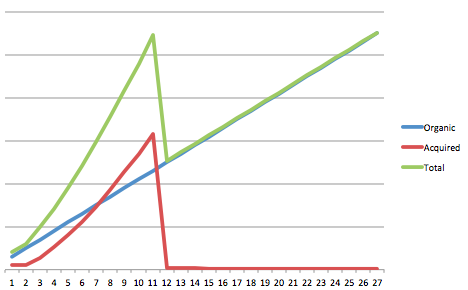Why paid online marketing is like a drug addiction
A lot of entrepreneurs think they can ramp up on marketing to accelerate growth and just see how it goes. They make the mistaken assumption that they can always switch off and go back to the nice organically drive growth they were enjoying before. That’s a mistake. The below example illustrates it in simple math. (and I speak from experience here as we witnessed this at my company PeoplePerHour)
Let’s assume you have a business that’s generating nice continued linear organic growth (defined here as new customers you acquire from word of mouth and referral).
Then one day you start spending – either you raised money or from retained profits. You do your math and you see that Customer Lifetime Value (LTV) is way in excess of your Cost of Acquisition, so you are acquiring profitably. You get excited and start spending more each month.
Then one day – be it because your working capital to fund the payback period is getting excessive (even though its profitable it may take a few months to break even on each acquisition) or because you are launching some big new product changes and are unsure of how they will affect your unit economics, you bring it to a halt. This is what happens.

The total dips and doesn’t get back to level playing field for (in this example) for over a year. Even though you still have the same underlying growth so arguable your business is still as solid as it was. To the outside world it looks like a sinking ship
Now in practice it’s not as simplistic as this. Organic growth is itself a function of acquired growth so the line will not be linear, it will ramp up as you spend more. And equally when you switch off paid marketing it wont slump to zero it will decline gradually as there is a ‘wake’ effect downstream as all the eyeballs you purchased are still converting with a latency. So something like this is more realistic (or in fact a ‘belly’ slump in the middle which i couldn’t be bothered to model on excel so use your imagination :))

The premise is the same. A ‘switch-on’ – ‘switch-off’ tactic doesn’t take you where you were before. You have a desert in the middle to cross until natural organic growth adds up enough to take you to where the peak was before you switched off. You are paying the price of over-spending beyond your means. Your paying the price of your drug addiction.
Of course the more you spend before entering the desert the higher the peak and the longer it takes to get to what seems like growth again (and if you have no organic growth you are simply screwed)
And mean time you are frustrated because when you look at the underlying drivers of the business they are the same. You still have happy customers, they are still referring and talking about you and the underlying organic growth is the same or steeper. But no one will listen to that. They don’t care – output is all that matters to them. Why should they? You are paying the price of greed in the pre-switch off period.
So be careful. Don’t look at marketing as having effects today which you can wipe out tomorrow. Consider the impact of switching it off because you may have to. Maybe a new competitor comes along and out-spends you so you decide to go down the sensible route. That’s when you will see this belly curve effect.
People – be it investors or partners – who really understand this should not be put off so long as you have continued underlying growth. But even the ones that do who are opportunistic will turn a deaf ear in order to squeeze you more. Your growth halted = you screwed up. What’s under the hood doesn’t matter.
The best tactic of course is to not need this at all and just focus on building a great product and keep pushing that organic growth line. Which is what we now do at PeoplePerHour.
Mean time I see colleagues of mine basking in the glory of exponential growth spending a tonnes of money and smile. Some may pull it off because they will always get more capital (few); some don’t even have an underlying organic growth curve but that’s hidden under the glory of the top line: those are sitting on top of nothing short of a ponzie scheme.
I’m not writing this to criticize others but rather to shed the leanings from our mistakes. We’ve now crossed that desert I’m happy to say and growing healthily without any drug addiction. We focus on delivering great service and building great products that people love, talk about and use increasingly every day. And that’s the best way (in my view) to grow sustainably, especially in fickle financial markets (and they will always be fickle and subject to irrational exuberance)
This is not to say that spending in marketing is bad. What’s bad is depending on others funding it. If you do spend, make sure you can hold your own if you ramp down, for whatever reason, and reasons will come. Sooner or later.

















Your email address will not be published.